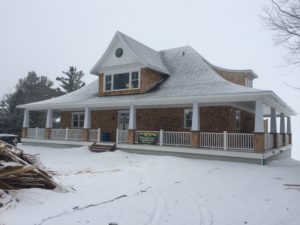
The McKiernan’s retirement home required insulation for an unusual roofing structure. Biofoam was the perfect solution. Images courtesy of Kingdom Bio Foam.
By George Harvey
Kingdom Bio Foam is a small insulating company in Vermont’s Northeast Kingdom. Its story might best begin with an example of its work.
When Neil and Pamela McKiernan decided to build their retirement home, they knew exactly where they wanted it to be. They had spent many vacations at a summer home in Island Pond, Vermont, and that was where they wanted to live. Their new home is built on a property directly on the lake that gave the village its name.
Island Pond is a “census-designated place” in the municipality of Brighton. It had 810 residents, according to the census of 2010. Even so, it had about two-thirds of the people who lived in Brighton. Please understand that the whole of Essex County, the most northeastern of Vermont’s counties, has barely over 6,300 people.
Island Pond is more active than census figures might suggest. Because of local winter activities which bring many visitors into the area, Island Pond has been called “the snow mobile hub of the Northeast.” More to our immediate interests, however, is the fact that despite its size, it has some well-informed business people working in areas of plumbing, heating, and insulation. And so, when the McKiernans needed to find people to do those jobs on their new home, they were able to work with local companies.
The McKiernans have a large family, and they wanted a large home to accommodate them when they visited, regardless of the time of year. This meant that they needed both an efficient heating system and an efficient building. Neil McKiernan, who is knowledgeable about building construction, consulted with Darren Tardif of Tardif Plumbing and Mechanical on the heating and decided to install heating from two sources. One is a radiant system in the floor with the heat fueled with propane. The other is a pair of heat pumps in a custom-built system for heating and cooling.
The insulation was installed by Kingdom Bio Foam. Owner, Coty Reeve, was trained by Spray Foam Distributors of New England and the Insulation Contractors Association of America in programs that look at best practices, energy code, and building code provisions for foam insulation. The courses emphasize R-values, vapor retarders, continuous air barriers, flame-spread index, smoke-development ratings, foam density, uses of spray-applied foam versus rigid foam, ignition barriers, thermal barriers, blower door testing, and municipal inspections. He keeps up to date on insulation practice by continuing regular training.
Kingdom Bio Foam’s name represents the company’s position supporting green building and sustainability. It is a family-owned business doing its part to reduce the nation’s dependence on foreign energy, reduce its carbon footprint, and improve customers’ indoor air quality by providing the most professional insulation services possible.
Nearly all of the foam sprayed by Kingdom Bio Foam is GacoOnePass Closed Cell Foam. This is a polyurethane foam with some surprising recommendations. It was subjected to the Air Barrier Association of America’s material evaluation and received appropriate approvals. It was also awarded GREENGUARD and GREENGUARD Gold Certifications, which signify compliance with stringent chemical emissions guidelines.
The sprayed foam prevents air infiltrations, effectively preventing a set of problems that can arise from pollutants, dust, pollen, moisture, and mold. Not only does this insulation prevent loss of heat, in many cases it also adds significantly to the rigidity of the building.
Site preparation started with isolating the work area, covering and masking electric boxes and outlets. Windows, doors, and anything else that is not to be insulated is similarly masked. Ventilation has to be set up, providing fresh air while the work is done. Only workers wearing proper protective gear are allowed into the site during the spraying process.
Once the spraying is complete, the window and door frames are sealed by installing a special foam to caulk and seal the cracks around them. Excess foam is scraped off and removed, masking tape and plastic films, and product containers are removed, and everything is made tidy.
At the McKiernan home, the insulation was installed in November, providing R-values of 28.8 in the basement and exterior walls and 50.4 in the ceiling. Once that was done, the propane radiant floor system could be run economically and construction work in the house could be finished in a fairly warm environment. The house was so efficiently weatherized that the radiant floor heat provided to the basement was enough to heat the entire building. At this writing, it is about 95% complete. The McKiernans hope to move in before summer.
Kingdom Bio Foam’s website is kingdombiofoam.com.
Many thanks to our sponsor:









Leave a Reply